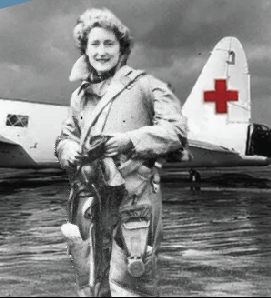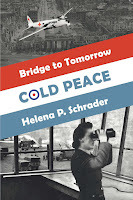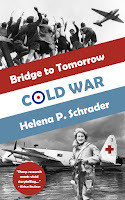The Characters of "Cold War" - Emily Priestman
The Bridge to Tomorrow Series is designed to depictthe first confrontation of the Cold War from a variety of perspectives. It was structured around a large cast of characters to allow the reader to see evolving events from different points-of-view. Representing all the characters on the cover would have made it confusing, so I had to select just one.
I chose Emily Priestman

Readers familiar with the best-selling Battle of Britain novel, "Where Eagles Never Flew," will recognize Emily as the girl from the Salvation Army canteen who captures the heart of RAF fighter ace Robin Priestman. The daughter of Communist activists, she studied medieval history at Cambridge before the war, but falls in love with flying after meeting and marrying Robin. In 1942, she learns to fly with the ATA and spend the rest of the war ferrying aircraft, including Britain's first jets, to RAF squadrons.
In the post war period, however, she can't find employment and becomes increasingly introverted and embittered. When Robin is posted to Berlin, she seizes the opportunity to become involved in the establishment of Air Ambulance International (AAI), a private aviation company engaged in flying sick and injured patients to hospitals in the West. By the opening of "Cold War", Emily's role as a partner in AAI and to her husband has become crucial. Almost unnoticed, she has become the mortar holding things together.
The below excerpt features Emily on a "routine" flight for Air Ambulance International"
When they collected the weather report fortheir return trip, they were warned that a thunderstorm was brewing. It wasn’tanything particularly dangerous, just a “heat storm,” the met officer said.Under normal circumstances, they could have flown around it, but because theyhad to stay in the corridor, they were going to have to fly through it. Furthermore,without patients, they were not given precedence over the Airlift freighters andspent fifty minutes in the take-off queue. By then the sky was dark and thefirst, thick drops of rain fell on the cockpit windscreen. Emily reached forward to activate the windscreenwipers.
The skies remained dark the entire flight,although the thunderstorm never materialised. Apparently, it had passed to the northof them. Then suddenly, just twenty minutes short of Berlin, the aircraft was abruptlyand violently shaken by turbulence.
Emily yelped involuntarily, and, embarrassed,confessed to Kiwi. “Sorry! I’ve never encountered air turbulence as abrupt andbad as that before.”
“I hateto tell you this, Emily, but that wasn’t turbulence. It was flak.” He pointedto the distinctive puff of brown-black smoke just ahead but to the right oftheir track.
Emily’s mouth went dry and then the Wellingtonwas shaken a second time. Another puff of smoke erupted on their left as thenurse put her head through the curtain to ask in a panicked tone what washappening.
Emily replied it was just Soviet “war games”and they were not in danger. She persuaded her to go back into the fuselage andstrap herself in.
When they were alone again, Kiwi informed her,“On the assumption that they are aiming to miss us, I am notgoing to take evasive action but will hold altitude, course, and speed. Thatway they’ll know where not to shoot.”
As a third burst of flak rattled the aircraft,however, they could hear the nurse calling on God’s help.
“I’d better go back and see if I can calm herdown,” Emily suggested and started to unstrap herself.
Kiwi held her in place with a firm hand on herarm. “Nothing is going to calm her down and there are no patients back therefor her to upset. It’s better for you to stay where you are.”
She looked at him blankly.
“You need to be ready to take over thecontrols, if I get injured.”
“But if they’re not aiming at us—” Emilystarted.
Kiwi cut her off. “Shrapnel from a near misscan pierce the fuselage. The exterior is just linen and glue, remember? Theaircraft is in no danger. It’s designed for this. But a big piece of shrapnelcould easily take off my foot, hand, or head.”
Or mine, Emily added mentally, and she drew adeep breath to steady herself. The flakwas still going off about three hundred feet ahead of them at 15-secondintervals. It mockingly marked a corridor for them.
Emily became so transfixed by the corridorbetween the black puffs of smoke marking the flak bursts that she only graduallybecame aware of voices in her earphones. Evidently, they were within range ofradio transmissions from Berlin air traffic control. A voice crackled, “…roger, Gatow Control.”
A second voice followed. “Rafair 038, Wilco.There’s a white Wellington with red crosses all over it two thousand feet belowand a mile ahead getting bracketed by it.”
A third voice came in, “They’re picking on thesmaller, lower and slower aircraft.”
“Moby Dick, can you read me?” Emily recognisedAssistant Section Leader Hart’s worried voice. Before Emily had a chance toanswer, Hart urged anxiously, “Come in, Moby Dick!”
Emily had the horrible feeling that Robin wasin the tower. They would have told him incoming aircraft were reporting flakand he would have gone up to hear the radio transmissions for himself. Takingthe mic, she answered in a voice pitched to sound completely relaxed, “GatowControl, this is Moby Dick.” Stretching to look down and confirm theirposition, she added only marginally prematurely, “We’re passing into Berlinairspace now. No damage or injuries.” Silently she added, “This time.” Shehoped fervently that Robin would not ground her. Far from putting her offflying, the flak highlighted the character of the enemy they were facing and reinforcedEmily’s commitment to keep flying patients out of their clutches.
Emily is a character in both of the First two volumes of the Bridge to Tomorrow Trilogy

The first battle of the Cold War is about to begin....
Berlin 1948. In the ruins ofHitler’s capital, former RAF officers, a woman pilot, and the victim of Russianbrutality form an air ambulance company. But the West is on a collision coursewith Stalin’s aggression and Berlin is about to become a flashpoint. World WarThree is only a misstep away. Buy Now
Berlin is under siege. More than twomillion civilians must be supplied by air -- or surrender to Stalin's oppression.
USAF Captain J.B. Baronowsky and RAF FlightLieutenant Kit Moran once risked their lives to drop high explosives on Berlin.They are about to deliver milk, flour and children’s shoes instead. Meanwhile,two women pilots are flying an air ambulance that carries malnourished andabandoned children to freedom in the West. Until General Winter deploys on theside of Russia. Buy now!
Based on historical events, award-winning and best-selling novelistHelena P. Schrader delivers an insightful, exciting and moving tale about howformer enemies became friends in the face of Russian aggression — and how closethe Berlin Airlift came to failing.
Winning a war with milk, coal and candy!



